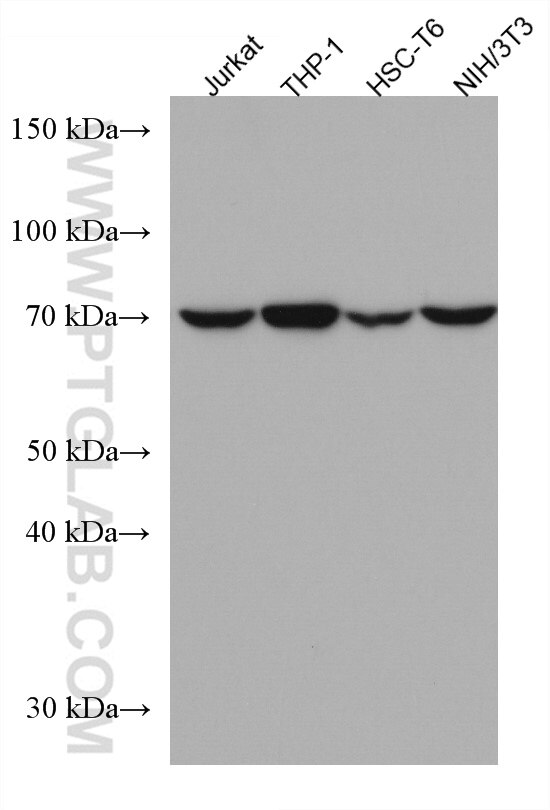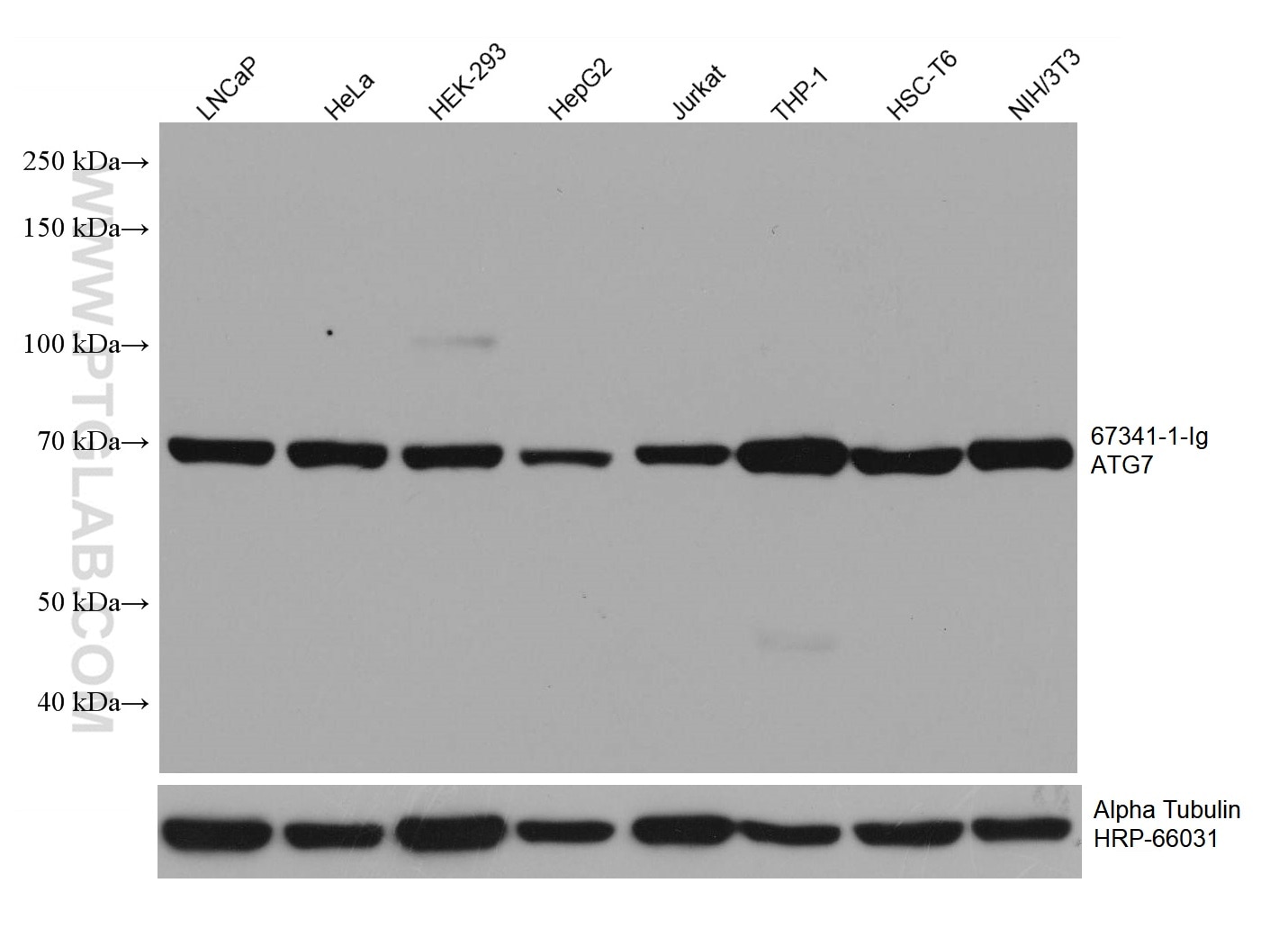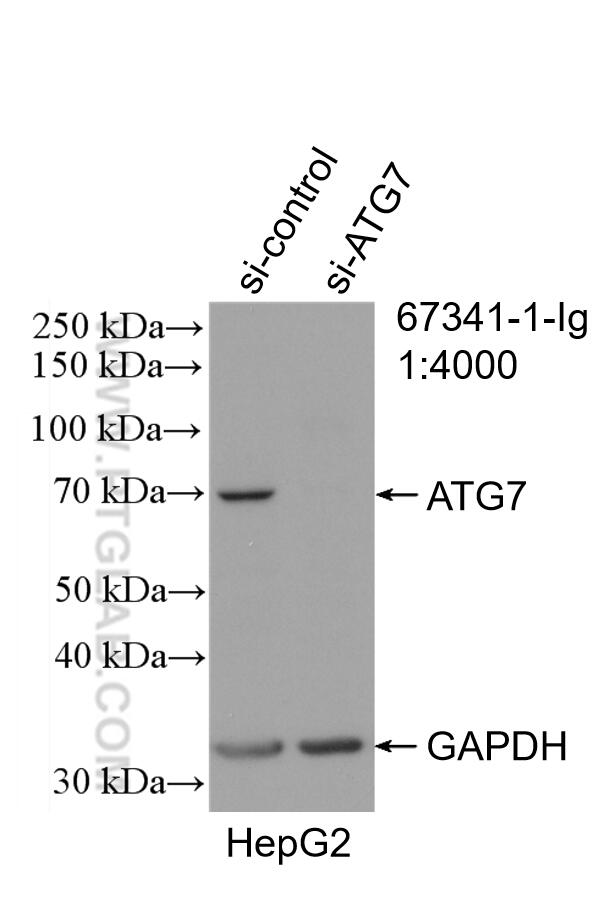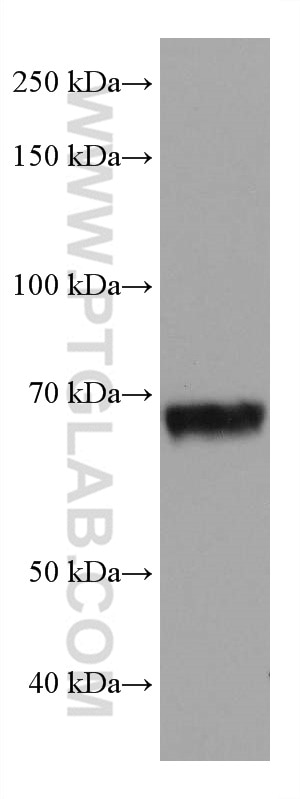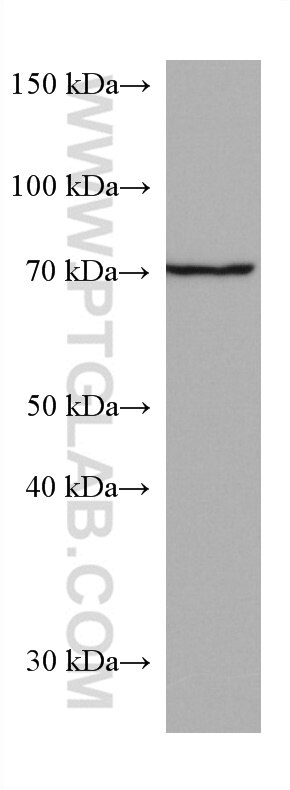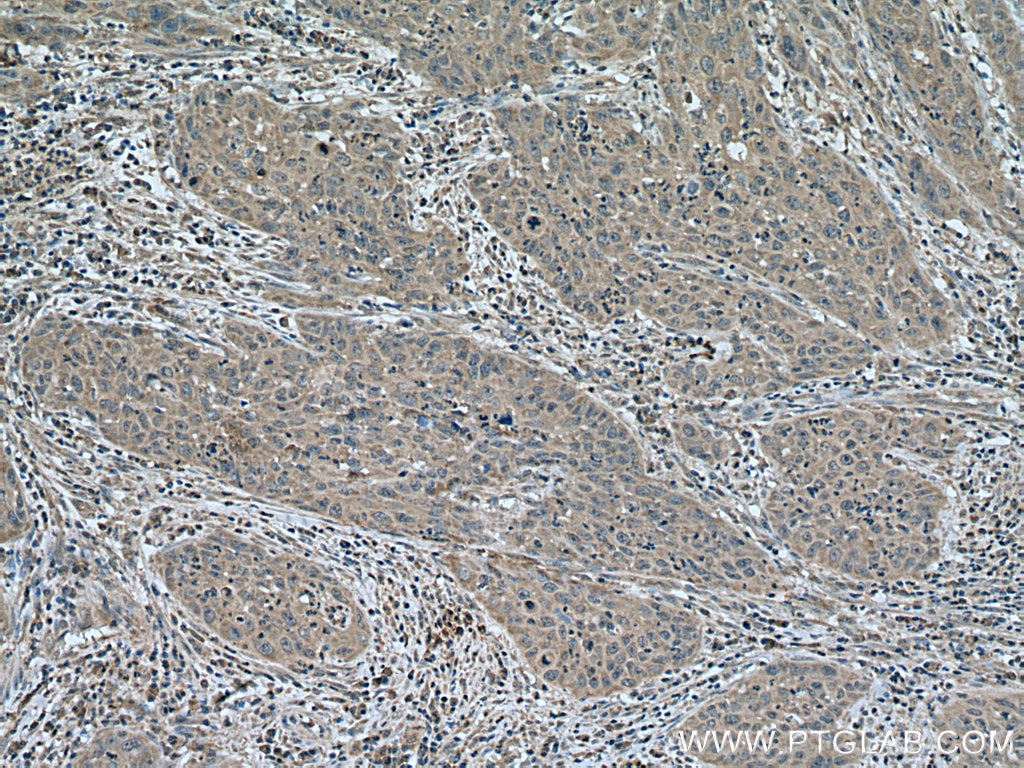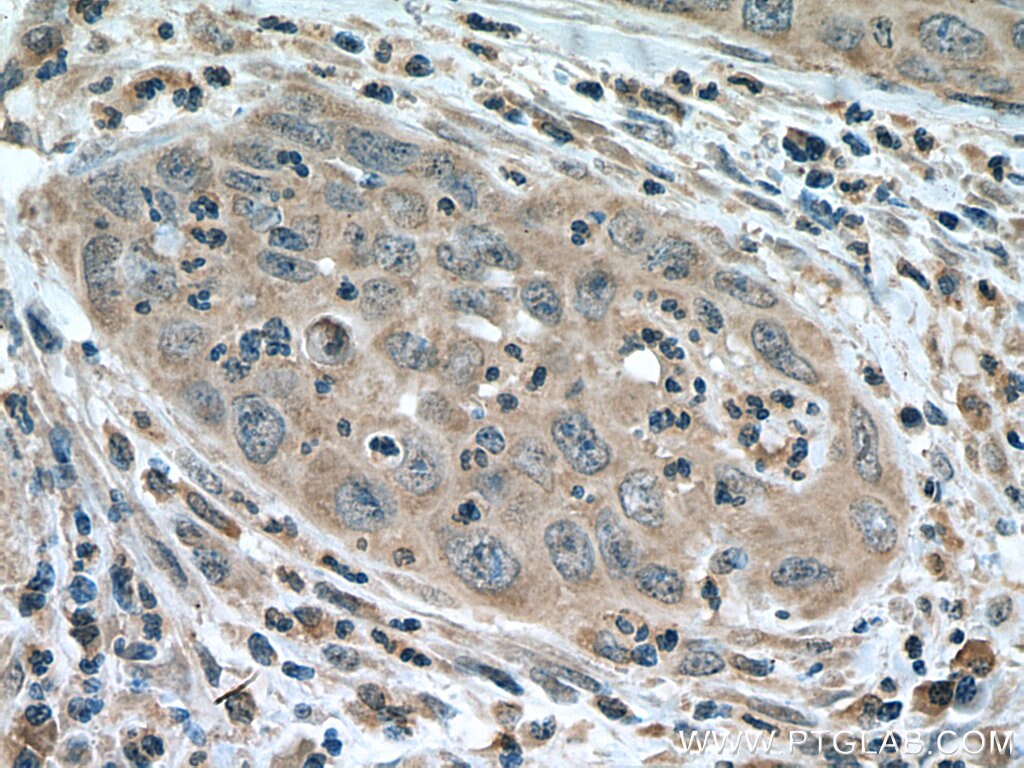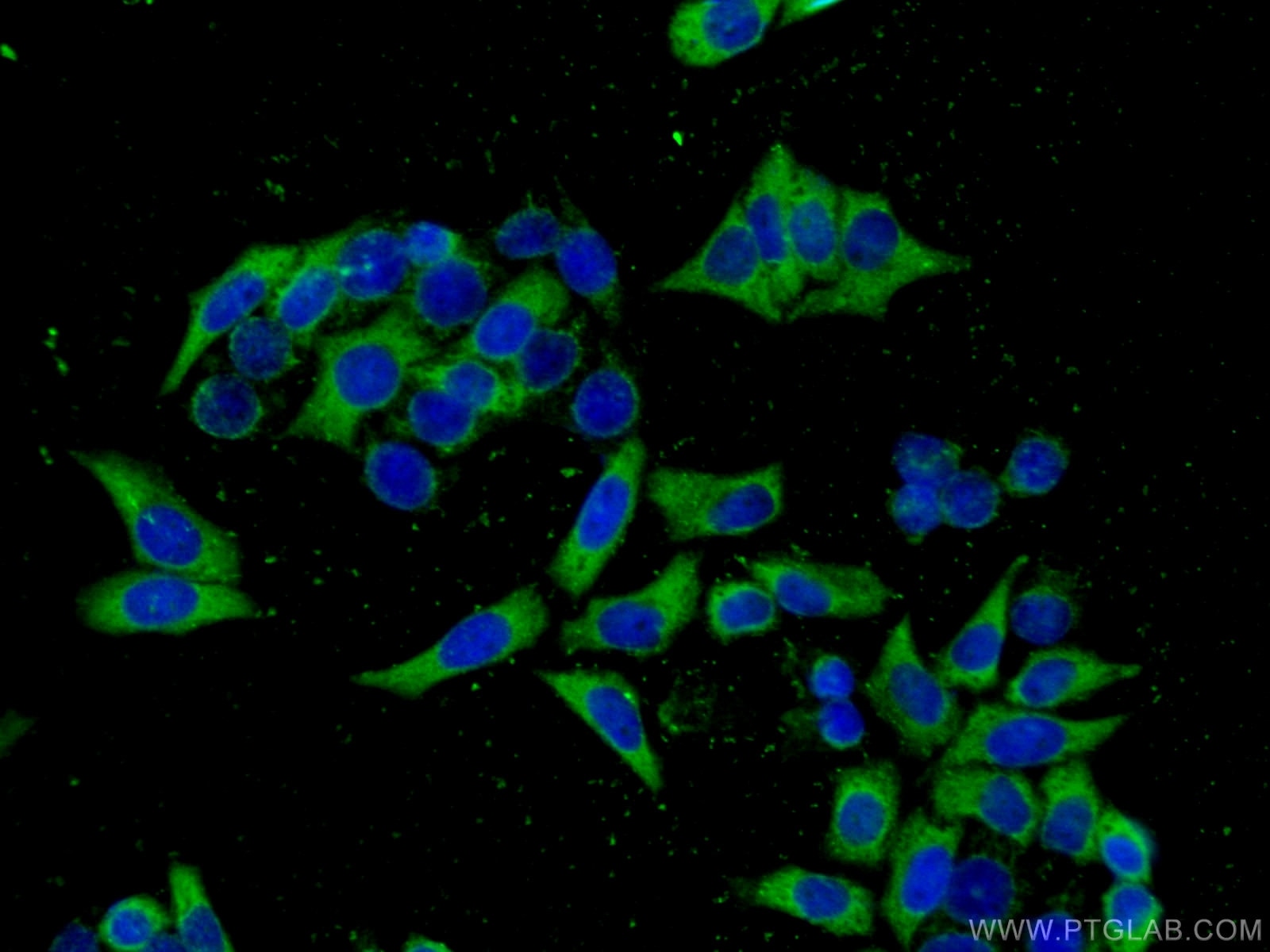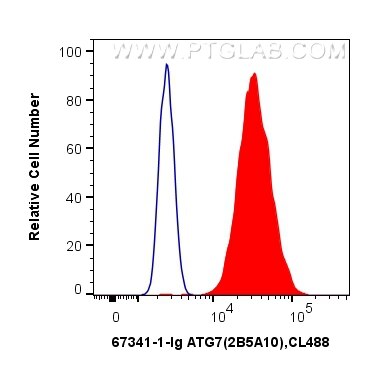- Featured Product
- KD/KO Validated
ATG7 Monoklonaler Antikörper
ATG7 Monoklonal Antikörper für WB, IHC, IF/ICC, FC (Intra), ELISA
Wirt / Isotyp
Maus / IgG2a
Getestete Reaktivität
Hausschwein, human, Maus, Ratte und mehr (1)
Anwendung
WB, IHC, IF/ICC, FC (Intra), IP, ELISA
Konjugation
Unkonjugiert
CloneNo.
2B5A10
Kat-Nr. : 67341-1-Ig
Synonyme
Geprüfte Anwendungen
| Erfolgreiche Detektion in WB | LNCaP-Zellen, 4T1-Zellen, HEK-293-Zellen, HeLa-Zellen, HepG2-Zellen, Jurkat-Zellen, NIH/3T3-Zellen, Hausschwein-Milzgewebe, THP-1-Zellen |
| Erfolgreiche Detektion in IHC | humanes Zervixkarzinomgewebe Hinweis: Antigendemaskierung mit TE-Puffer pH 9,0 empfohlen. (*) Wahlweise kann die Antigendemaskierung auch mit Citratpuffer pH 6,0 erfolgen. |
| Erfolgreiche Detektion in IF/ICC | HeLa-Zellen |
| Erfolgreiche Detektion in FC (Intra) | HeLa-Zellen |
Empfohlene Verdünnung
| Anwendung | Verdünnung |
|---|---|
| Western Blot (WB) | WB : 1:5000-1:50000 |
| Immunhistochemie (IHC) | IHC : 1:500-1:2000 |
| Immunfluoreszenz (IF)/ICC | IF/ICC : 1:50-1:500 |
| Durchflusszytometrie (FC) (INTRA) | FC (INTRA) : 0.50 ug per 10^6 cells in a 100 µl suspension |
| It is recommended that this reagent should be titrated in each testing system to obtain optimal results. | |
| Sample-dependent, check data in validation data gallery | |
Veröffentlichte Anwendungen
| KD/KO | See 3 publications below |
| WB | See 36 publications below |
| IHC | See 1 publications below |
| IF | See 4 publications below |
| IP | See 1 publications below |
Produktinformation
67341-1-Ig bindet in WB, IHC, IF/ICC, FC (Intra), IP, ELISA ATG7 und zeigt Reaktivität mit Hausschwein, human, Maus, Ratten
| Getestete Reaktivität | Hausschwein, human, Maus, Ratte |
| In Publikationen genannte Reaktivität | human, Hund, Maus, Ratte |
| Wirt / Isotyp | Maus / IgG2a |
| Klonalität | Monoklonal |
| Typ | Antikörper |
| Immunogen | ATG7 fusion protein Ag29172 |
| Vollständiger Name | ATG7 autophagy related 7 homolog (S. cerevisiae) |
| Berechnetes Molekulargewicht | 78 kDa |
| Beobachtetes Molekulargewicht | 68-78 kDa |
| GenBank-Zugangsnummer | BC000091 |
| Gene symbol | ATG7 |
| Gene ID (NCBI) | 10533 |
| Konjugation | Unkonjugiert |
| Form | Liquid |
| Reinigungsmethode | Protein-A-Reinigung |
| Lagerungspuffer | PBS with 0.02% sodium azide and 50% glycerol |
| Lagerungsbedingungen | Bei -20°C lagern. Nach dem Versand ein Jahr lang stabil Aliquotieren ist bei -20oC Lagerung nicht notwendig. 20ul Größen enthalten 0,1% BSA. |
Hintergrundinformationen
Atg7 is an E1-like enzyme that is specifically involved in autophagosome formation and is essential for autophagy. As an autophagic-related protein it is required for linking to Atg12, Atg5 and Atg8, which are essential for Atg conjugation and autophagosome formation. Atg7 has been reported as an important regulator of autophagy with starvation-induced or chemotherapeutic agent treatment. The high expression level of ATG7 is related to the survival of patients with breast cancer. There are several isoforms of ATG7 protein ranged from 68 kDa to 78 kDa.
Protokolle
| PRODUKTSPEZIFISCHE PROTOKOLLE | |
|---|---|
| WB protocol for ATG7 antibody 67341-1-Ig | Protokoll herunterladen |
| IHC protocol for ATG7 antibody 67341-1-Ig | Protokoll herunterladenl |
| IF protocol for ATG7 antibody 67341-1-Ig | Protokoll herunterladen |
| FC protocol for ATG7 antibody 67341-1-Ig | Download protocol |
| STANDARD-PROTOKOLLE | |
|---|---|
| Klicken Sie hier, um unsere Standardprotokolle anzuzeigen |
Publikationen
| Species | Application | Title |
|---|---|---|
Adv Sci (Weinh) Mitochondrial tRNAGlu 14693A>G Mutation, an "Enhancer" to the Phenotypic Expression of Leber's Hereditary Optic Neuropathy | ||
Cancers (Basel) Nucleolar Stress Functions Upstream to Stimulate Expression of Autophagy Regulators. | ||
J Cell Physiol Cold exposure-induced endoplasmic reticulum stress regulates autophagy through the SIRT2/FoxO1 signaling pathway | ||
Stem Cell Res Ther Oncostatin M receptor regulates osteoblast differentiation via extracellular signal-regulated kinase/autophagy signaling. |
Rezensionen
The reviews below have been submitted by verified Proteintech customers who received an incentive for providing their feedback.
FH Margaux (Verified Customer) (06-20-2025) | Used at 1/5000 for western-blot in HeLa cells. It worked very well.
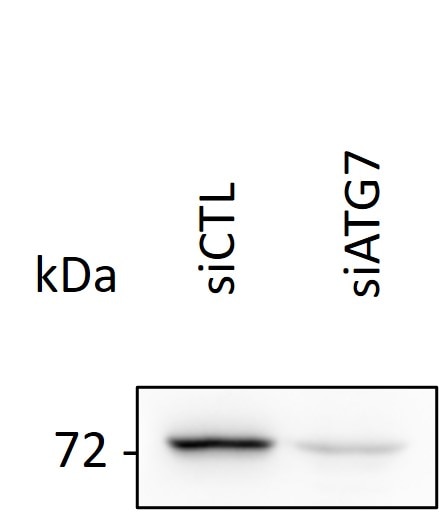 |
